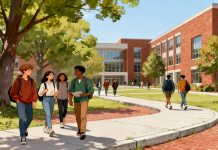Unschooling movement says no to schooling of any kind: How important, in our world today, is formal institutionalized education? A relatively new and growing segment of families are deciding to not only go against the majority by choosing to homeschool, but taking it to another level by choosing to embody a complete lifestyle called Unschooling.
Unschooling is a parenting and lifestyle choice that revolves around freedom and child-led learning. Un-schooled children are not subjected to any curriculum or learning routine whatsoever. That’s right — no math worksheets, no memorization note cards, no reading assignments, no essays, nothing.
Instead they have free reign of what they learn.
Children are encouraged to explore the world without parameters, guidelines, or expectations. Children are set loose and the parents serve to support and facilitate the natural process of curiosity-based learning. Unschooled children are allowed to realize their natural interests and parents facilitate this process by providing resources that allow the child to pursue his or her interests.
As you can imagine, there are major critiques of this method of parenting as well as very passionate proponents and everything in between. Like most things in life, unschooling could happen on a sort of sliding scale. Where there are a lot of parents who drift from homeschooling into a less structured style that could be called unschooling, but who may still create or enforce some degree of structure, there are inevitably those on the very far end of the spectrum- a segment called ‘radical unschoolers’ who take the unschooling philosophy to the utter extreme.
Radical unschoolers can include those families with almost no perceptible structure for their children whatsoever. There are of course mainstream media stories about unschooling and as you might guess, some of them not-so-surprisingly based their news stories around examples of unschooling families that would fit into the radical category, as it makes a more interesting story and also, an easier target of insult.
Granted, unschooling is a genuinely radical concept relative to conventional schooling. In a couple of these news stories families were featured who didn’t impose any kind of hygiene rules, bedtimes, mealtime standards, or any traditional rules on their children at all. These news stories were happy to point out that at times radically unschooled kids would choose to eat a whole bag of cookies or stay up until the middle of the night at times, for example, making unschooling seem outlandish and almost uncivilized.
The perspective from an unschooling parent, is of course, more favorable. The belief of the parents who adopt this method is that as human beings, we are naturally curious, we are built to be self-starting, self-motivated, and that given the right conditions, we are designed to learn and to enjoy learning. From this paradigm, traditional educational institutions hinder the freedom of children, stifle their individuality and creativity, and force them to learn lots of useless information. Rather than force-feeding the same information to every child across the spectrum, unschooled children, ideally, will be able to hone in and learn the specialized types of information that will facilitate their development as individuals, will engender their independence and problem solving skills, and will allow them to pursue things that actually reflect their unique talents and strengths.
Another major drawback of public schooling, acknowledged by many, is the over-diagnosis of behavioral disorders such as ADHD. Children are naturally high-energy, high-curiosity, and physically active. It is not until a certain age that children are able to really focus on a single task and keep their bodies comfortably still for longer periods of time. It has been noted that children who display behaviors which lead to them begin diagnosed with a disorder, were behaviors that weren’t a problem until they were in a school setting. This could mean that the high amount of children being diagnosed with behavioral disorders could be a result of the unnatural state of school environments rather than an indication that there is something wrong with the children.
As a rule, public schooling is highly structured. There is almost no time during the day when students are not required to be doing something specific and this explains why there are always those students who are outliers, cannot seem to ever follow the rules, disturb the learning environment for others, and end up often in trouble or receiving discipline. Every child is unique, so it makes little sense that each child should be expected to learn the same way and then be punished if they cannot succeed in such an environment.
Considering the major downsides of school, it is easy to understand why unschooling is an attractive option to many people. It allows the free flow of the child’s natural energy and state of being so that he or she can be and explore who they are and what makes them tick. Without expectations for a certain performance and standard, they would never be subjected to criticism or comparison to other students which can be harmful to self-esteem.
In many ways, it seems like unschooling could be a fantastic option for many children and families; but what about the future?
If a person receives no formal education, can they still attain higher education and a career? The answer, surprisingly to some, seems to be yes.
A study was carried out on 272 adults who had either partially or entirely been unschooled. There is a link to the study in the sources listed at the bottom which provides full details of this study.
To sum it up, out of the participants, the ones who had received no homeschooling or traditional schooling whatsoever, were actually the most likely out of the participants to have successfully pursued higher education. Not only did the great majority of participants state that they were able to attend various colleges or vocational schools, but that they felt they were better equipped than their peers because they were self-motivated and self-directed and were not burned out from many previous years of institutional education. In fact, many responded that they were disappointed with the lack of intellectual stimulation in social interactions because many of their fellow students were more interested in parties than in discussions and ideas.
What’s more, the study revealed that the great majority of participants were, at the time of the study, financially independent and employed.
Interesting also, more than half of the unschooled participants were working in or pursuing creative jobs and many were entrepreneurs in creative fields.
It seems that unschooling could give people an edge over the general population by freeing them to be self-motivated and to pursue their true gifts and interests. What do you think, would you unschool your children?
Make sure to respond in the comments and check out some of these interesting links about unschooling:
sourced:
A Survey of Grown Unschoolers I: Overview of Findings







